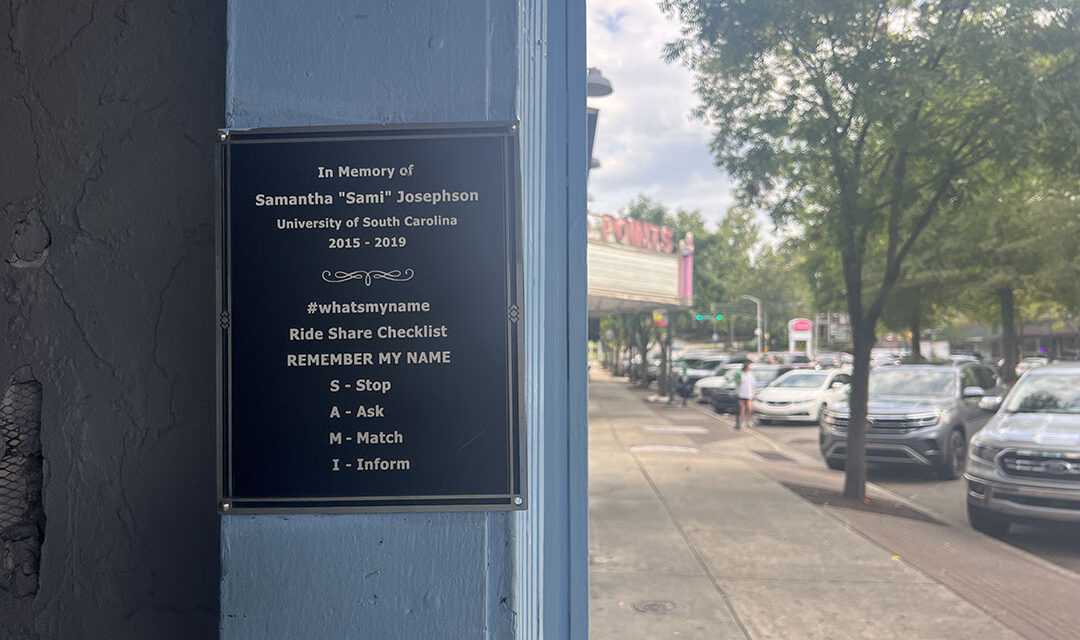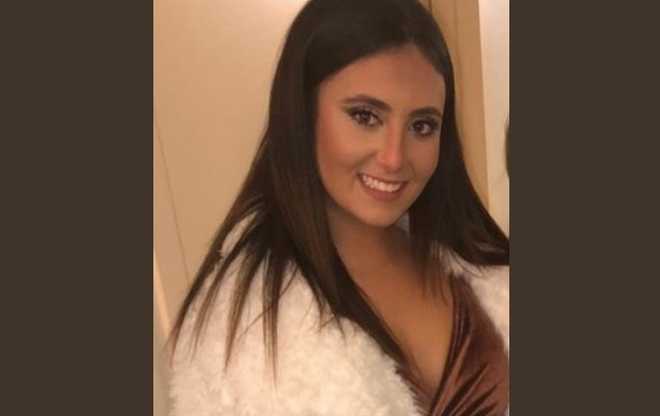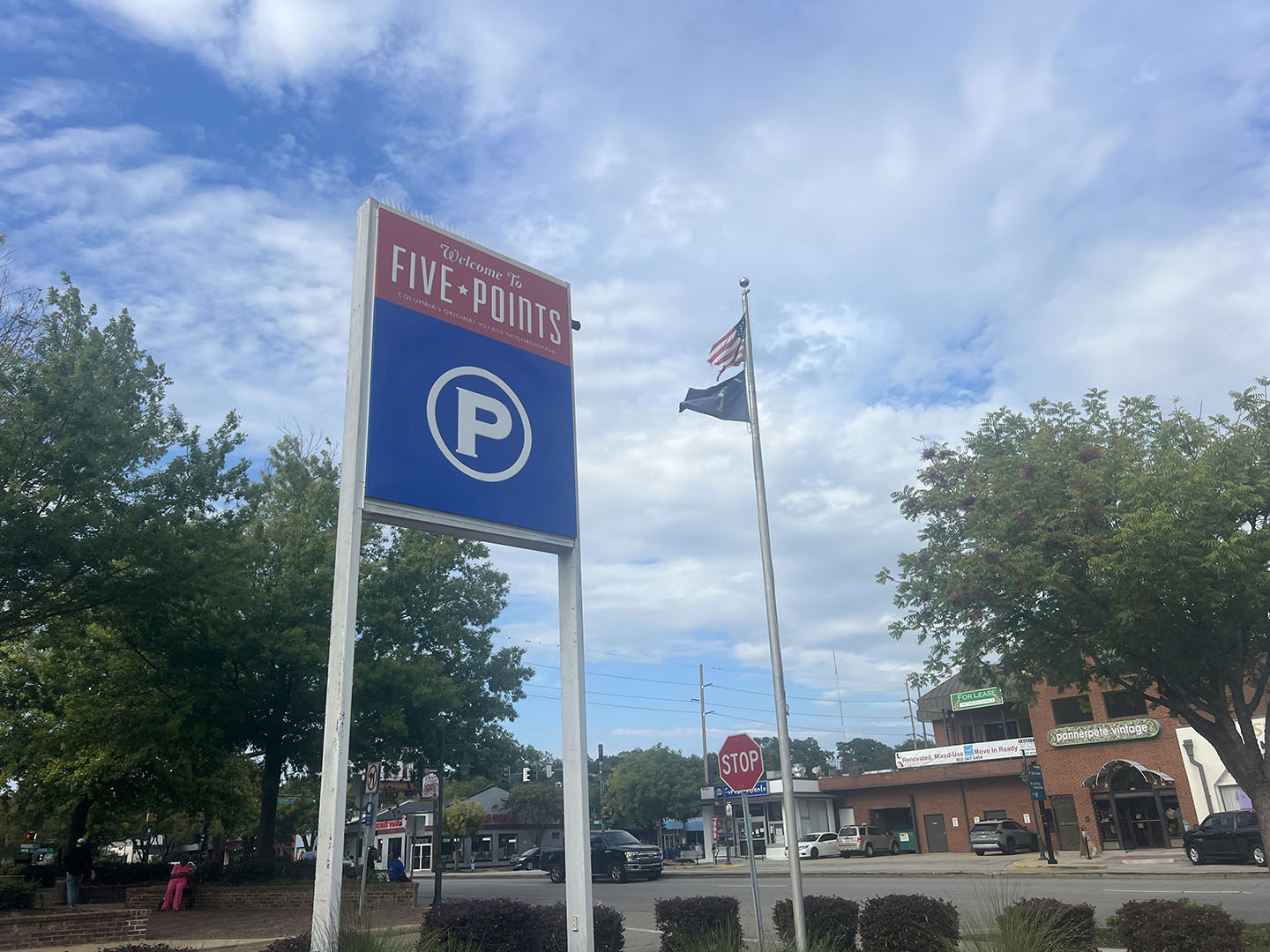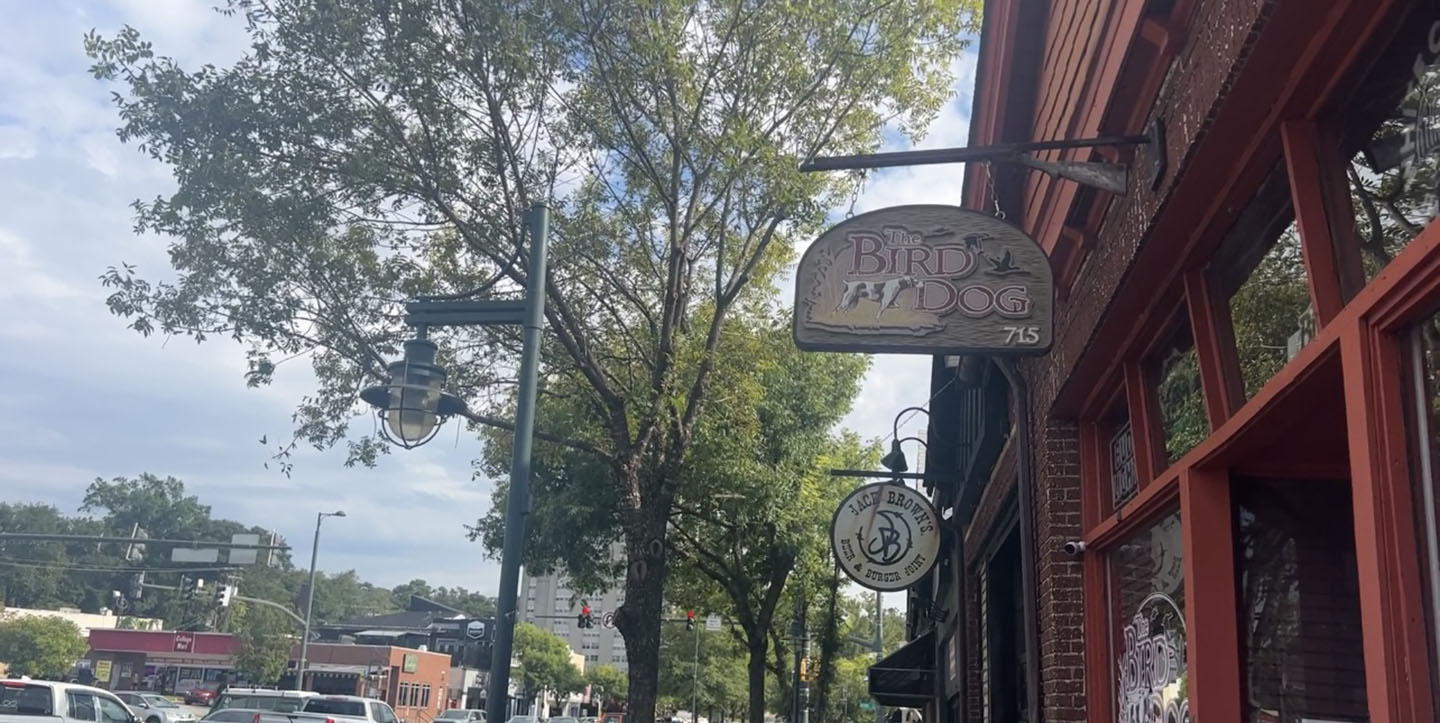A “SAMI” sign located in Five Points. (Photos by Sophia Laico/Carolina News and Reporter)
The father of a murdered USC student says more work needs to be done to keep other students from being killed while using ride-share services.
The most well-known, national safety measure to come from the 2019 incident was the idea of encouraging riders to ask “What’s my name?” before they get into a ride-sharing vehicle.
But there also was Sami’s Law, a national law that mandates a recurring, biennial federal study of the ride-share industry. The law was created in memory of Samantha “Sami” Josephson, a senior at the University of South Carolina who got into what she thought was an Uber car in the popular Five Points entertainment area. Her body was found the next morning in Clarendon County by turkey hunters.
Sami’s Law, backed by her family, was signed by President Joe Biden in January. Results are not yet available of the first study of attacks involving ride-share vehicles, taxis and rented limousines.
But Seymour Josephson, Samantha’s father, says in addition to that study, he’s pushing for three things. He wants a mandatory confirmation of each rider’s and driver’s identity, a ban on people who aren’t ride-share drivers from purchasing ride-share window stickers and the creation of Sami’s Council, a group that would meet one to two times a year to review the industry.
‘It’s about assaults on passengers and drivers’
Josephson has been working to ensure that what happened to his daughter does not happen again.
“You combine their number of sexual assaults, which is 13,963, and 49 deaths,” said Josephson of reportings from Uber for 2017-20 and from Lyft for 2017-2019. “That does not include Sami” because the driver wasn’t an Uber driver.
Uber said after the incident that it was working with colleges and law enforcement to ensure riders know about the potential for fake Uber drivers.
“Everyone at Uber is devastated to hear about this unspeakable crime, and our hearts are with Samantha Josephson’s family and loved ones,” Uber said in a statement. “We remain focused on raising public awareness about this incredibly important issue.”
Most of the assault victims are women, Josephson said, but some are men.
“It does happen to men,” Josephson said. “We get emails and phone messages and everything from either men or the spouses of men and they’ve woken up with their pants around their ankles. But they don’t report it because they’re embarrassed.”
“We’re hoping that it gives legitimacy to the industry of getting full federal law with the other three things that we have proposed,” Josephson said.
Sami’s Council, one of Josephson’s other proposals, would be made up of 11-15 members who would report their findings to federal transportation officials.
Making ride-share sign purchases from unauthorized resellers illegal is the other proposal. Anyone who is not a certified ride-share driver could no longer go out and buy a ride-share sign online to put on their car.
“So, if you’re not an authorized Uber or Lyft driver and then purchase the signs, and you get caught, you’re going to get fined or put in jail,” Josephson said.
The third proposal is having a permanent and mandatory confirmation system for ride-share programs to ensure that drivers and riders confirm each other’s identities before the drive can begin.
The Josephson family’s “What’s My Name” Foundation states on its website: “Ride-sharing companies would need to roll out technology that would match passengers with their drivers’ vehicles. A driver couldn’t begin the trip until the passenger and driver verify each other’s identities.”
Driver safety
Since 2016, Tiziana Johnston has been an Uber driver in New Jersey, where the Josephsons live.
Her son and his girlfriend were both friends of Sami.
Johnston does not drive with the Uber sign visible in her car, except in mandatory places such as airports.
“The reason why is because I didn’t want somebody (who wasn’t my rider) to get in my car, knowing I was an Uber driver,” Johnston said.
Johnston followed all the same safety protocols before Samantha’s incident that she does today. She has been enforcing Uber safety and the “SAMI – Stop, Ask, Match, Inform” message for a long time.
The message consists of four steps: to review the safety features in the app before getting into a ride, to ask the driver “What’s my name?,” to match the make, model, and license plate to the one displayed on the app and to share your trip details with a friend.
She does this for everyone’s benefit.
“I didn’t want somebody to just walk up to my car and get in my car that didn’t belong in my car,” Johnston said. “I can’t tell you how many times they would try to get into my car, and it wasn’t for them.”
Johnston said she has heard many horror stories over the years about other drivers from her previous passengers.
“They need to make the passenger aware of things like when they have a driver that wants to go out with them to a bar or wants to do drugs with them or when they aren’t driving the same car that’s on the app,” Johnston said. “So, the education is still not there.”
The role of the colleges
Josephson is determined to continue teaching ride-share education.
He has traveled to many colleges, spreading the word. Colleges have taken part in advocating for the “What’s My Name?” Foundation, which was created in Samantha’s honor.
Josephson said ride-share safety education should be ongoing.
“It’s just not one time and done,” Josephson said.
Johnston, too, attests to the importance of education.
“I can’t tell you how many times I lecture these girls when they get in my car,” Johnston said. “They don’t ask me what their name is. And I lecture them. And I tell them the whole story.”
What do students think?
Kate Hunter, a USC junior from Columbus, Ohio, said she has heard of Samantha Josephson’s death and goes through the safety steps suggested by the “What’s My Name?” Foundation.
“But even then, sometimes I’ll do that and I’m still like, ‘I don’t know about this guy,’” Hunter said.
USC senior Sarah Hardaway said Sami’s Law has made women feel safer.
“It has made the girls of Columbia more aware and vigilant of the dangers that are right in front of us,” Hardaway said via an Instagram message.
What is being done to spread the word to more people?
Josephson and his wife, Samantha’s mother Marci Josephson, have been working to spread the word to more communities.
They’re especially targeting fraternities, sororities and law enforcement agencies.
The “What’s My Name?” Foundation seeks donations to help, raising money through events, such as a 5K run/1mile walk.
To learn more about the foundation or to donate, visit https://www.whatsmyname.org/.





